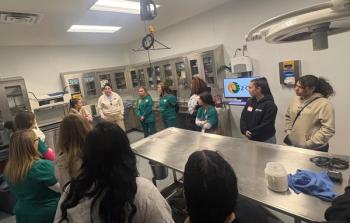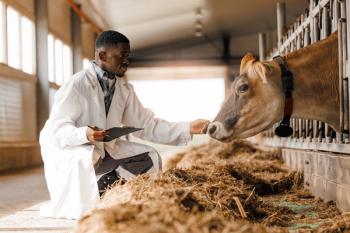
- dvm360 February 2022
- Volume 53
- Issue 2
How research of an FIP treatment for cats is saving human lives
The work of Niels C. Pedersen, DVM, PhD, provided a foundation for investigators studying an antiviral drug for treating COVID-19.
Few know more about coronaviruses than Niels C. Pedersen, DVM, PhD, distinguished professor emeritus at the University of California-Davis (UC Davis) School of Veterinary Medicine. Pedersen has been chasing various species-specific coronaviruses for decades.
For those who aren’t familiar with his legendary status, Pedersen was also heavily involved with research into the genetic basis of autoimmune disorders of dogs and genetic diversity among breeds. Pedersen was the director of the Center for Companion Animal health and the director of the Veterinary Genetics Laboratory at UC Davis. His name is on approximately 300 peer-reviewed papers, he has contributed chapters to many books, and he authored his classic text, Feline Husbandry: Disease and Management in the Multiple-cat Environment.
One constant from the very start of Pedersen’s career was unraveling mysteries of coronaviruses in various species—most of all, domestic cats. It was Pedersen who figured out that the typically benign feline coronavirus is responsible for feline infectious peritonitis (FIP). For decades, FIP was considered fatal and has only recently been adjusted to treatable, largely because of Pedersen’s work.
“We studied FIP for many years and tried to develop vaccines at first, but they weren’t working,” Pedersen said in an interview on WGN Radio. “Finally, about 7 years ago, I thought about antivirals, as I had experience with antivirals for [human immunodeficiency virus]. I discovered a drug [that] was intended for Ebola but didn’t work very well—a nucleoside analog—and I knew it had a wide spectrum of activity against coronaviruses.”
With funding from what was then the Winn Feline Foundation (now EveryCat Health Foundation), Pedersen used a drug very closely related to the antiviral remdesivir to treat cats with FIP. He was even surprised by the overwhelming success. The kitties were living and thriving for well over a year after his initial work, which is unheard of for cats correctly diagnosed with FIP.
However, Pedersen was unable to obtain the patent for the drug, so he and Yunjeong Kim, DVM, PhD, an associate professor in the Department of Pathobiology and Diagnostic Medicine at Kansas State University College of Veterinary Medicine, created a drug they called GC376, which ultimately had an even higher degree of success in treating the wet form of FIP.1
Anivive Lifesciences, an animal health pharmaceutical company, recognized the potential. It was announced at the 2019 Winn Feline Foundation FIP Symposium that Anivive is in the process of seeking approval for GC376 through the FDA Center for Veterinary Medicine for treating FIP.1
Although treatment for cats with FIP has been approved in other nations, it is not yet approved by the FDA Center for Veterinary Medicine for use in the United States. So other companies came along, selling products to desperate cat parents, and these knock-off products mostly appear to work.2
Meanwhile, along came the pandemic. If it wasn’t for Pedersen’s studies with a drug nearly identical to remdesivir succeeding for cats with FIP, it’s unlikely anyone would have thought about using this long forgotten about antiviral. However, it turns out remdesivir has now been used around the world to treat COVID-19, caused by SARS CoV-2. Remdesivir has saved countless human lives, or at least has contributed to saving lives, and is also used to treat FIP, saving cat lives.
Being the expert on coronaviruses, Pedersen was asked what his crystal ball looks like regarding the pandemic. He was optimistic and said the “Omicron [variant] is what we were hoping for. The worst is at first, and in a quirky sense, it’s to their [the coronaviruses] genetic advantage not to make victims so sick that they die. We have a highly transmissible virus, which isn’t nearly as pathogenetic compared [with] the previous isolates."
He said he believes the most common variant at the time, Delta, may have landed in another mammal, such as a mouse. Inside the mouse, the virus recombined and ultimately was transmitted back to a human. “Omicron may be humanized now and will be endemic. It’s certainly not benign and, being a coronavirus, may continue to change some,” Pedersen said. “But for now, at least this is the dominant strain around the world, and I think it will be this way for some time. At least that is the hope.”
References
- Pedersen NC, Thayer V, Lyons L, Dale S, et al. PURRsuing FIP and WINNing. Presented at: 2019 Winn Feline Foundation FIP Symposium; November 16- 17, 2019; Davis, CA. Accessed January 25, 2022. https://everycat.org/wp-content/ uploads/2021/03/FIP-Summary.pdf
- Jones S, Novicoff W, Nadeau J, Evans S. Unlicensed GS-441524-like antiviral therapy can be effective for at-home treatment of feline infectious peritonitis. Animals (Basel). 2021;11(8):2257. doi:10.3390/ani11082257
Articles in this issue
over 3 years ago
Enter the 2022 dvm360® Hospital Design Competitionover 3 years ago
What’s new in 2022over 3 years ago
Making room at the tableover 3 years ago
10 Dental hacks to enhance your veterinary practice in 2022over 3 years ago
Do we need a paradigm shift in canine neutering?over 3 years ago
Implementing virtual care in veterinary practiceover 3 years ago
Commentary: compensating trainees as paid staffover 3 years ago
At-home care is crucial to combating periodontal diseaseover 3 years ago
The dilemma: approaching retirementover 3 years ago
Providing oral health services and public informationNewsletter
From exam room tips to practice management insights, get trusted veterinary news delivered straight to your inbox—subscribe to dvm360.






